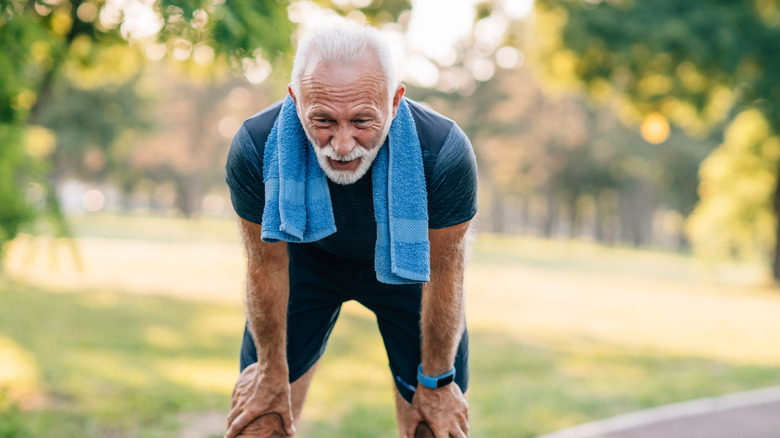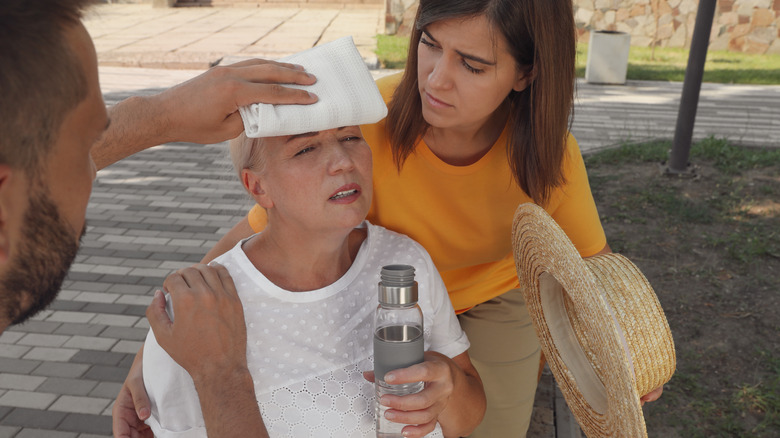The Maximum Amount Of Heat A Human Body Can Take
Observations of the earth show that it's getting hotter, according to the Washington Post. And you likely feel it, as the heat waves in June that have you cranking up your air conditioner. Even a trip to the store leaves you soaked in sweat. If this sounds familiar, you might be starting to wonder how much heat your body can take before it starts to affect your health. While it appears to be a cut-and-dry answer, it's not. How hot your body can get varies based on many different facts — including the temperature and the humidity.
Your body releases heat by sweating. According to the National Institutes of Health, when you sweat, the heat evaporates on your skin and goes into the air. Sweating is a great way to cool down. However, it doesn't always work. Your body will start to overheat if you don't find an additional way to cool down.
You'll learn the maximum heat a body can take and the different risk factors that might open you to heat-related illnesses. Keep yourself cool by learning how to prevent getting too hot.
Too hot for your core temperature to handle
When you think about the heat, you might think about the temperature outside. Sure, it can feel rather miserable when it gets up in the 100s. But if the human body can cool off, it can take the heat outside. When you think about the maximum heat the body can take, it's essential to think internally. The body's core temperature operates at optimal levels at about 98 degrees Fahrenheit.
But if your body can't cool off fast enough and reaches a sustained core temperature of 104 degrees Fahrenheit, the cells will start to melt, according to the Washington Post. Now that's not to say that your body can't handle a core temperature of 104 degrees (or higher) for short periods. You might have experienced a high fever that took you to the physician's office, and they worked to cool you down. It's when your core temp stays at 104 degrees Fahrenheit degrees or higher for an extended period of time that it becomes a medical emergency.
How your body gets that hot depends on many factors. Physiology research Zachary Schlader (via MIT Technology Review) says that it's not a straightforward answer. Humidity, age, and exertion come into play when it comes to the heat your body can take.
Risk factors to be aware of
The temperature outside that a human body can withstand includes several variables. Many researchers consider a "wet-bulb temperature" of 95 degrees Fahrenheit to be the human limit, according to the Journal of Applied Physiology. However, studies are showing that it might be lower. This is the concept where you wrap a wet cloth around the bulb of a thermometer. Dry air feels cooler because of evaporation, while humid air does not. For example, 100 degrees Fahrenheit will feel cooler with 0% humidity than 100 degrees Fahrenheit with 54% humidity.
Beyond just the temperature outside, age makes a difference in cooling down your body. According to Mayo Clinic, young children and mature adults have trouble coping with temperature changes. It also depends on what you are doing when exposed to the heat. Even young individuals working outside and exerting their bodies might start to overheat at lower temperatures than someone lying down at the same temperature on a blanket.
Having no way to cool yourself down can also be a risk factor. Since the human body can sustain increased temperatures in the core for short periods, cooling down in front of an air conditioner might be all you need. However, more prolonged exposure and lack of a way to cool down can put you in the danger zone. But your body doesn't just overheat. It will first give you a few warning symptoms that you need to cool off immediately.
Overheating symptoms to watch out for
Overheating in your body can happen quickly or slowly, depending on the risk factors. Younger, healthy individuals typically take longer to get overheated than a 70 year old would in the same heat. But your body starts to give you warning symptoms as your core temperature rises. According to the National Weather Service, you start to experience heat cramps in your legs and abdomen. This is typically accompanied by heavy sweating. Heat exhaustion adds symptoms of weakness, fast pulse, clammy skin, dizziness, and nausea. These symptoms are a clear sign you need to cool down fast. Heat stroke is a medical emergency. It can have all the symptoms of heat cramps and exhaustion with confusion, headache, hot skin, and a core temperature of 103 degrees Fahrenheit.
Heat stroke can happen quickly, so it's imperative to stay out of the heat when temperatures are high whenever possible. If it's impossible, wear breathable clothing, drink water regularly, move into an air-conditioned space when you can, and wet your skin (via the Centers for Disease Control and Prevention (CDC)). When you're outside, seeking a shaded area and staying out of direct sunlight is helpful.
The CDC also stated that those who work or exercise in hot conditions can experience rhabdomyolysis, which can lead to the death of the muscle. The condition includes symptoms of muscle cramps, weakness, and exercise intolerance. This can be dangerous for the body and cause kidney damage, so seek medical treatment immediately.
Stay cool in the heat with a few tips
As the world warms with climate change, it's crucial to figure out ways to prevent your body from getting too hot, especially during extended heat wave periods. One of the best ways is to stay in an air-conditioned area. Mayo Clinic recommends wearing sunscreen and sun-protective clothing (like hats) when you must be outside. You'll also want to ensure you have a lot of water to drink to ensure your body stays hydrated. Those working out in the heat need frequent breaks to allow their sweat to evaporate. Fans are also helpful.
MedStar Health also noted the importance of wearing light and breathable clothing to ensure your body can get enough air. Stay inside during the hottest parts of the day for those more sensitive to the sun or whose bodies might not cool down as quickly as they should. They also recommend using a buddy system to ensure no one succumbs to the heat.
The human body isn't designed to take significant heat changes. Optimally, you should maintain a core temperature of about 98 degrees. Core temperatures of 104 or more could lead to potential damage as the cells start to melt down. Prevention and quick treatment are key when dealing with extreme heat.





